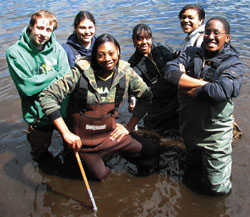 | Students from New Haven Public Schools were able to explore the research of Yale Professor David Skelly in an after-school program. The students have since produced the exhibition "Wood Frogs" at the Peabody Museum. |
A new exhibition at Yale's Peabody Museum of Natural History is literally hopping.
The display -- titled "Wood Frogs: Our Masked, Freezing, Quacking Forest Neighbors -- was created by participants in Evolutions (EVOking Learning & Understanding Through Investigations Of the Natural Sciences), an after-school program for high school students in the New Haven Public School system. The program seeks to encourage students' literacy and career-interest in science, technology, engineering and mathematics -- as well as college preparation and transferable skills development. Eighty students were recruited for the 2006-2007 school year, all of whom are eligible to earn academic credit at their schools for participating.
Through grants from United Illuminating and the National Science Foundation, the Evolutions students had the opportunity to explore firsthand the research of David Skelly, professor in the School of Forestry and Environmental Science, and the Department of Ecology & Evolutionary Biology. Skelly's lab is interested in understanding patterns of animal distribution and abundance. Much of this work is conducted in the Yale Myers forest and focuses on the wood frog. Students were introduced to local pond fauna and collection techniques during a visit to Skelly's field site. Working in groups, students also tried their hand at raising wood frog tadpoles under different experimental treatments in the lab.
This work culminated in the student-produced "Wood Frogs" exhibition now on display at the Peabody Museum. It features a terrarium set up to mimic a local vernal pool (a temporary spring pool), complete with several species of insects and amphibians. An accompanying video highlights the results of the students' tadpole experiments. Also on display are museum panels produced by Evolutions students that highlight various science careers. Exhibits will be on display through the end of July 2007.
Looking ahead, a gift from the H.A. Vance Foundation, along with additional grant funding from the National Science Foundation, is providing opportunities for roughly 32 Evolutions students to participate in paid internships with Yale science faculty over the next 12 months. These students will be involved in research focusing on everything from nano-imprinting to DNA extraction techniques.
The Evolutions program is directed by Jamie Alonzo (jamie.alonzo@yale.edu; (203) 432-6577). Additional information about the program is available at www.peabody.yale.edu/education/afterschool.html.
T H I S
Students' research on wood frogs
is featured in Peabody exhibit
 W E E K ' S
W E E K ' S S T O R I E S
S T O R I E S![]()
 Yale to increase medical and scientific research programs
Yale to increase medical and scientific research programs
 with acquisition of the Bayer HealthCare complex
with acquisition of the Bayer HealthCare complex![]()
 Acquisition to expand Yale's economic impact
Acquisition to expand Yale's economic impact![]()
 Milestones in building Yale's medical and scientific research strength
Milestones in building Yale's medical and scientific research strength![]()
![]()
 Study shows stem cells curb Parkinson's disease in primates
Study shows stem cells curb Parkinson's disease in primates![]()
![]()
 China proves 'a great joy' for Yale 'friends from afar'
China proves 'a great joy' for Yale 'friends from afar'![]()
![]()
 COMMENCEMENT 2007
COMMENCEMENT 2007
 With pomp, Yale celebrates its newest graduates
With pomp, Yale celebrates its newest graduates![]()
 Baccalaureate Address
Baccalaureate Address![]()
 Honorary Degrees
Honorary Degrees![]()
 Outstanding teachers and students are awarded prizes
Outstanding teachers and students are awarded prizes![]()
![]()
 Former Yale gallery director has been elected an alumni fellow
Former Yale gallery director has been elected an alumni fellow![]()
![]()
 NASA administrator is appointed University's first CFO
NASA administrator is appointed University's first CFO![]()
![]()
 'Lights, cameras and action!' come to campus
'Lights, cameras and action!' come to campus![]()
![]()
 Delegations travel to Brazil and Mexico for alumni-hosted events
Delegations travel to Brazil and Mexico for alumni-hosted events![]()
![]()
 Initiative seeks to promote effective use of solar power
Initiative seeks to promote effective use of solar power![]()
![]()
 Air pollution is shown to harm pregnant woman
Air pollution is shown to harm pregnant woman![]()
![]()
 SCHOOL OF MEDICINE NEWS
SCHOOL OF MEDICINE NEWS
 Sleep apnea is linked to heart disease and diabetes
Sleep apnea is linked to heart disease and diabetes![]()
 Research findings on FMRP protein may lead to . . .
Research findings on FMRP protein may lead to . . .![]()
 Residents' work-hour reductions not harmful to patients, study says
Residents' work-hour reductions not harmful to patients, study says![]()
 New radio show offers information, support to cancer patients
New radio show offers information, support to cancer patients![]()
 Scientific symposium will honor renowned faculty member
Scientific symposium will honor renowned faculty member![]()
![]()
 Students' research on wood frogs is featured in Peabody exhibit
Students' research on wood frogs is featured in Peabody exhibit![]()
![]()
 In Memoriam: Naturalist Charles L. Remington
In Memoriam: Naturalist Charles L. Remington![]()
![]()
 Performances will showcase talents of young playwrights
Performances will showcase talents of young playwrights![]()
![]()
 New Yale website illustrates the history of slavery in Connecticut
New Yale website illustrates the history of slavery in Connecticut![]()
![]()
 Campus Notes
Campus Notes![]()
Bulletin Home |
| Visiting on Campus
Visiting on Campus |
| Calendar of Events
Calendar of Events |
| In the News
In the News![]()
Bulletin Board |
| Classified Ads
Classified Ads |
| Search Archives
Search Archives |
| Deadlines
Deadlines![]()
Bulletin Staff |
| Public Affairs
Public Affairs |
| News Releases
News Releases |
| E-Mail Us
E-Mail Us |
| Yale Home
Yale Home